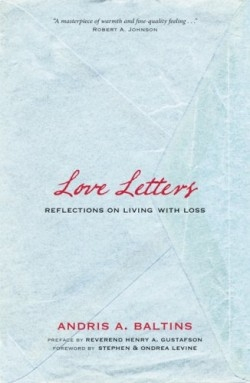It looks like you've stumbled upon a page meant to be read by our code instead of viewed directly. You're probably looking for this page.
Love Letters
Reflections on Living With Loss
Who’s to say how one should grieve? Only someone who has endured the tremulous mourning process and emerged, if not whole, at least intact, can know what to say and, better yet, how to say it.
After nearly twenty-eight years of marriage to his childhood sweetheart, Baltins lost his wife Nancy to stage-four ovarian cancer. In the days following her death, when Baltins’ sense of fragility was at its most pronounced, he searched for a way to make sense, not only of what his life was to become, but of what his life had been.
So began a series of letters to Nancy, thirty-nine of which are gathered in a candidly reflective collection that expresses intense pain as well as immense joy, stark honesty as well as sublime remorse. For Baltins, a respected practitioner of business law, such a contemplative journey was an uncharted one: “When I sit down to write these letters to you, Nancy, I have no sense of what will appear on these pages. It’s like I’m building a road by reverse engineering: I’m constantly at my destination, looking back to appreciate the path by which I arrived.”
That path began at the outset of Nancy’s chemotherapy. A deeply spiritual woman, Nancy herself acknowledged the challenge such a rigorous course of treatment presented, yet saw it as an opportunity to transcend the parameters of her temporal existence in order to more fully appreciate her essential being. “That’s what our lives are about,” Nancy told her husband. “Discovering our self-imposed limitations and discarding them.”
It was a philosophy that would serve Baltins well as he persevered on his own, raising their two children, maintaining important routines and relationships. Whereas he previously considered himself incapable of doing all that his wife had done, and done well, by writing to Nancy, Baltins found a way of coming to terms with daunting tasks. “I realize my love for you didn’t change the course of the cancer that took your life. But I can accept what I can’t change and change what I can—my attitude.”
As with all such introspective exercises, Baltins’ is a fiercely personal reckoning, yet one that has universal implications. Surprisingly, Baltins seems reluctant to capitalize on his hard won insight—“I’ve learned I don’t know how anything feels for someone else,” he protests. The act of sharing these poignant love letters belies such an assertion, for it is precisely this sense of intimacy that imbues Baltins’ keenly rendered portrait of a grieving husband with authenticity. Baltins does indeed know what to say, and says it with heartfelt simplicity and grace.
Disclosure: This article is not an endorsement, but a review. The publisher of this book provided free copies of the book to have their book reviewed by a professional reviewer. No fee was paid by the publisher for this review. Foreword Reviews only recommends books that we love. Foreword Magazine, Inc. is disclosing this in accordance with the Federal Trade Commission’s 16 CFR, Part 255.
